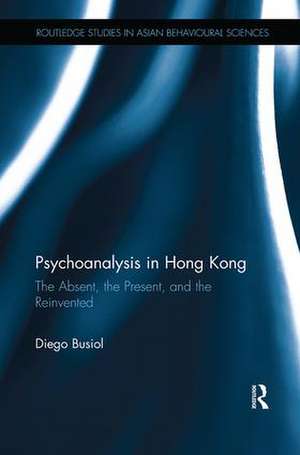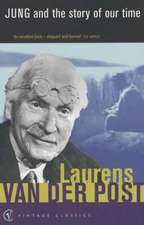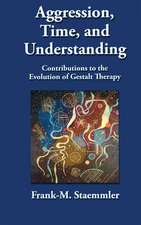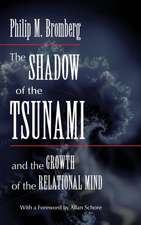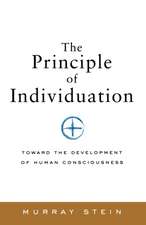Psychoanalysis in Hong Kong: The Absent, the Present, and the Reinvented: Routledge Studies in Asian Behavioural Sciences
Autor Diego Busiolen Limba Engleză Paperback – 11 mai 2018
The book addresses key issues such as:
- Is there psychoanalysis in Hong Kong?
- How does one do research on psychoanalysis in Hong Kong?
- Why was the Freudian Unconscious not discovered in China?
- How can we describe the core of psychoanalysis and how can this description be understood in different cultural contexts?
- Can psychoanalytic research be led by adopting a quantitative or statistical methodology?
| Toate formatele și edițiile | Preț | Express |
|---|---|---|
| Paperback (1) | 291.26 lei 43-57 zile | |
| Taylor & Francis – 11 mai 2018 | 291.26 lei 43-57 zile | |
| Hardback (1) | 820.06 lei 43-57 zile | |
| Taylor & Francis – 5 oct 2016 | 820.06 lei 43-57 zile |
Preț: 291.26 lei
Preț vechi: 340.69 lei
-15% Nou
Puncte Express: 437
Preț estimativ în valută:
55.75€ • 60.58$ • 46.86£
55.75€ • 60.58$ • 46.86£
Carte tipărită la comandă
Livrare economică 21 aprilie-05 mai
Preluare comenzi: 021 569.72.76
Specificații
ISBN-13: 9781138604582
ISBN-10: 1138604585
Pagini: 194
Ilustrații: 12 Tables, black and white
Dimensiuni: 156 x 234 x 18 mm
Greutate: 0.37 kg
Ediția:1
Editura: Taylor & Francis
Colecția Routledge
Seria Routledge Studies in Asian Behavioural Sciences
Locul publicării:Oxford, United Kingdom
ISBN-10: 1138604585
Pagini: 194
Ilustrații: 12 Tables, black and white
Dimensiuni: 156 x 234 x 18 mm
Greutate: 0.37 kg
Ediția:1
Editura: Taylor & Francis
Colecția Routledge
Seria Routledge Studies in Asian Behavioural Sciences
Locul publicării:Oxford, United Kingdom
Public țintă
Postgraduate and ProfessionalCuprins
1: Two apparently distant worlds: psychoanalysis and Hong Kong 2: How to do research on psychoanalysis, in Hong Kong? 3: The research study 4: Is there psychoanalysis in Hong Kong? 5: Why the (Freudian) unconscious was not discovered in China? Other and Desire in Hong Kong
Notă biografică
Diego Busiol is a certified clinical psychologist and psychoanalyst with a private practice in Hong Kong, and a postdoctoral fellow at the Department of Applied Social Sciences, City University of Hong Kong.
Descriere
While psychoanalysis is raising some interest in Mainland China and in Taiwan, it remains only marginally relevant in Hong Kong. This book attempts to explain why. Addressing the subject from an East to West approach, this study proposes an experience of displacement, as it is argued that the chance for psychoanalysis today is not just to be exported to the East, but asking how psychoanalysis can be re-invented after experiencing the culture in Hong Kong. What remains of psychoanalysis, after this? How to re-invent and innovate psychoanalysis today? This study also debunks the myth that psychoanalytic research cannot be led by adopting a quantitative/statistical methodology.
